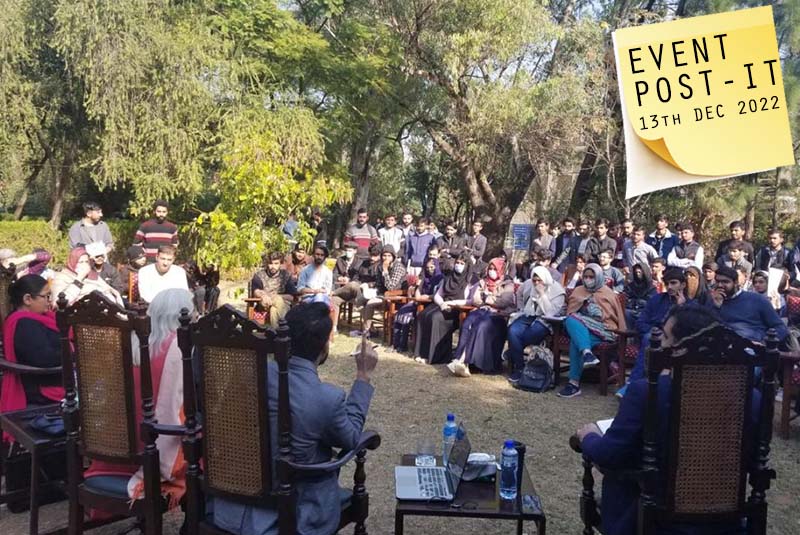UNIVERSITY TOWNHALLS
Climate Catastrophes: Who Gets Left Behind?
Date: December 15, 2022
Global debates on climate justice emphasise the principle of leaving no one behind, yet the arduous journey of rebuilding in the wake of climate catastrophes has shown that many communities will not make it to the end. Is climate justice a mere slogan, and will the call for rights-based climate action remain unanswered? To unpack this debate, Jinnah Institute convened a University Town Hall titled ‘Climate Catastrophe: Who Gets Left Behind?’ in collaboration with Quaid-e-Azam University. The event was moderated by Salman Zaidi, Director Jinnah Institute, and senior experts including environmental journalist Afia Salam, academic Noaman G. Ali and gender expert Shabana Arif discussed these themes with students and faculty members.
The Global South has historically paid the cost of Western countries’ development, and this continues to be the case today, stated Afia Salam. Although the causation of climate catastrophes is not attributable to us in the global south, yet we remain badly affected by its ramifications. The larger question becomes: who gets left behind and for what reason in the fight for climate justice? Pakistan may be listed among the top climate vulnerable nations, however, even within the nation there are groups suffering disproportionately from the impact of floods. The poorest cohort pays the highest social and economic cost of disasters because of inequities rooted in our infrastructural failures that result in persistent unequal distribution of resources. Funds allocated for development are invested in infrastructure advancements that barely make a difference in the lives of poor groups. Climate change has only exacerbated the existing inequities that have characterised our society for a long time, and will be the toughest test of whom we secure and how, in the race to safeguard ourselves from climate change.
Shabana Arif highlighted that climate injustice is fundamentally connected to gender inequalities and gender-based violence, which become more evident during times of crisis. In addition to traditional forms of gender-based violence, natural disasters have pushed women further away from avenues of justice, maternal healthcare, primary education and nutrition. Women with disabilities, transgendered persons, the elderly and infirm suffer disproportionately during natural disasters owing to limited mobility or social networks. “Climate calamities have reversed most of the progress on women’s health and development in flood affected areas, despite women-specific legislation and policy reforms over decades”, she stated, adding that risks for maternal and child mortality are now higher than ever, owing to the large scale destruction of social infrastructure, including basic healthcare units. In addition, she stated that religious minorities have experienced discrimination during rescue and relief operations as seen in multiple field visits to flood affected areas.
Social inequities, political turmoil and corruption have worsened the impact of climate disasters, said Noaman Ghazanfar Ali. Climate change is the latest lens to review the systemic crisis in Pakistan, although the water sector, environment, food and agriculture have long witnessed our failures in governance. These crises are based on a deliberate governance mechanism introduced during the colonial era, rooted in exploitation of environmental resources and labour, to create benefits for those insulated from the impact of natural disasters. We must recognize that climate justice demands ways of combating climate imperialism working within international forums like COP, as well as the impact it has on our political economy. Our failure to engage with institutions and actors taking decisions on our behalf will guarantee that the climate crisis worsens; our poorest groups will continue to bear the brunt of climate catastrophes as they have no choice, and those who profit from these exploitative systems will do everything in their power to maintain the status quo.

